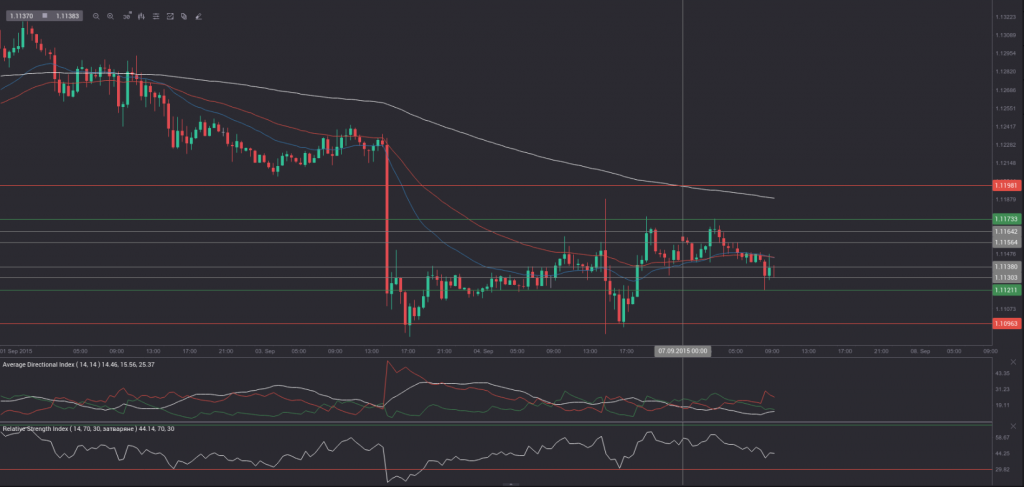Friday’s trade saw EUR/USD within the range of 1.1088-1.1181. The pair closed at 1.1147, up 0.22% on a daily basis, which has been the first gain in the past three trading days. The cross lost 0.47% for the week, while marking a second consecutive weekly decline.
At 7:03 GMT today EUR/USD was down 0.15% for the day to trade at 1.1134. The pair tested the range support level (S3), as it touched a daily low at 1.1122 at 6:25 GMT.
Today the cross may be influenced by a number of macroeconomic reports as listed below.
Fundamentals
Euro area
Sentix Investor Confidence Survey
Confidence among investors in the Euro zone probably worsened a second month in a row in September, with the corresponding index coming in at a reading of 16.1. If so, however, September would be the ninth consecutive month, during which the gauge occupied positive territory. In August it stood at 18.4. The index is based on results from the SENTIX survey, one of the most prominent surveys, reflecting investors’ opinion in Germany. It encompasses 2 800 respondents, with 510 of them being institutional investors. Respondents present their expectations regarding ten different markets for a period of one and six months. Readings above zero indicate that respondents were predominantly optimistic, while readings below zero show pessimism. Lower-than-expected readings would have a limited bearish effect on the common currency. The official index value is due out at 8:30 GMT.
United States
Labor Day
The first Monday of September is the Labor Day National Holiday in the United States. Many people tend to mark this day as the summers end and usually organize a number of outdoor activities. Government offices, schools and organizations and a number of businesses are to remain closed. US markets will be closed as well.
Fridays unemployment report favors a rate hike this month
On Friday the US dollar received support against its major peers, after an official report by the US Bureau of Labor Statistics showed the rate of unemployment fell to 5.1% in August, outstripping expectations of a lesser drop, to 5.2%. It has been a level unseen in at least 7.5 years. In July the rate was reported at 5.3%. On the other hand, employers in all sectors of US economy except the farming industry added 173 000 jobs in August, which fell short of the median forecast pointing to a job growth of 220 000. The July figure has been revised up to 245 000 jobs added from the initially reported 215 000. Market players considered the data as rather positive and supporting the case of a rate hike by the Federal Reserve at the upcoming policy meeting on September 16th-17th. In the minutes following the release EUR/USD plunged sharply to a daily low of 1.1091. GBP/USD initially plummeted to 1.5208 and, as the US session developed, it extended losses to mark a daily low of 1.5160.
Correlation with other Majors
Taking into account the week ended on September 6th and the daily closing levels of the major currency pairs, we come to the following conclusions in regard to the strength of relationship:
EUR/USD to GBP/USD (0.5913, or strong)
EUR/USD to AUD/USD (0.3519, or moderate)
EUR/USD to USD/CAD (0.2312, or weak)
EUR/USD to USD/JPY (-0.0005, or very weak)
EUR/USD to NZD/USD (-0.1632, or weak)
EUR/USD to USD/CHF (-0.9745, or very strong)
1. During the examined period EUR/USD moved strongly in one and the same direction with GBP/USD.
2. EUR/USD moved almost equally in the opposite direction compared to USD/CHF during the past week.
3. The correlation between EUR/USD and USD/CAD, EUR/USD and NZD/USD was insignificant during the past week.
4. EUR/USD moved almost independently compared to USD/JPY. There barely was any correlation.
Bond Yield Spread
The yield on German 2-year government bonds went as high as -0.222% on September 4th, after which it slid to -0.235% at the close to lose 0.003 percentage point on a daily basis, while marking a second consecutive trading day of decrease.
The yield on US 2-year government bonds climbed as high as 0.733% on September 4th, or the highest level since September 1st (0.735%), after which it fell to 0.709% at the close to add 1.3 basis points (0.013 percentage point) for the day. It has been the first gain in the past four trading days.
The spread between 2-year US and 2-year German bond yields, which reflects the flow of funds in a short term, widened to 0.944% on September 4th from 0.928% during the prior day. The September 4th yield spread has been the most notable spread since August 18th, when the difference was 0.974%.
Meanwhile, the yield on German 10-year government bonds soared as high as 0.717% on September 4th, after which it slid to 0.664% at the close to lose 6.7 basis points (0.067 percentage point) compared to September 3rd, while marking a third straight day of decline.
The yield on US 10-year government bonds climbed as high as 2.169% on September 4th, after which it slipped to 2.131% at the close to lose 3.2 basis points (0.032 percentage point) on a daily basis, while marking a second consecutive trading day of decrease.
The spread between 10-year US and 10-year German bond yields widened to 1.467% on September 4th from 1.432% during the prior day. The September 4th yield difference has been the largest one since August 26th, when the spread was 1.472%.
Daily and Weekly Pivot Levels
By employing the Camarilla calculation method, the daily pivot levels for EUR/USD are presented as follows:
R1 – 1.1156
R2 – 1.1164
R3 (range resistance – green on the 30-minute chart) – 1.1173
R4 (range breakout – red on the 30-minute chart) – 1.1198
S1 – 1.1138
S2 – 1.1130
S3 (range support – green on the 30-minute chart) – 1.1121
S4 (range breakout – red on the 30-minute chart) – 1.1096
By using the traditional method of calculation, the weekly pivot levels for EUR/USD are presented as follows:
Central Pivot Point – 1.1188
R1 – 1.1291
R2 – 1.1434
R3 – 1.1537
S1 – 1.1045
S2 – 1.0942
S3 – 1.0799






